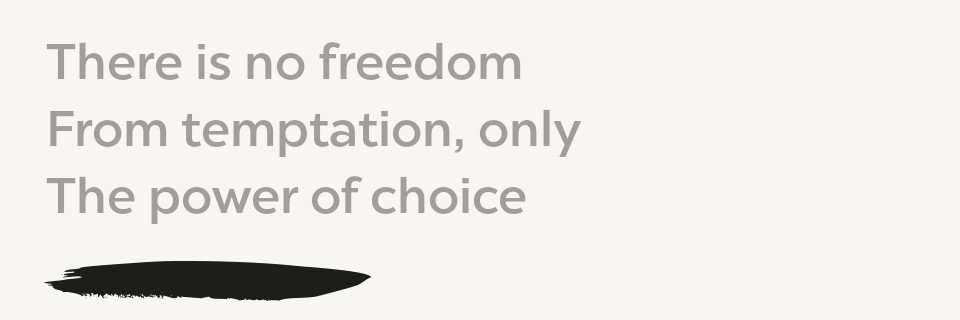In part one of this series, I deconstructed the infamous, “There is no spoon” scene from The Matrix to begin our celebration of the film’s twenty year anniversary. Next, I want to examine two important, and opposite choices in the movie that represent aspects of the human psyche: the choice Neo makes to leave the Matrix, and the choice Cypher makes to re-enter it.
In this article, we’ll address the latter. Cypher is obviously the most cynical of the Nebuchadnezzar crew. He’s skeptical that Neo is the one, enviously teases Trinity about her interest in Neo, and even complains about the breakfast food while everyone is eating (bad form!). He’s sleazy, voyeuristically checking out women in matrix code, and creepily touches Trinity’s unconscious body while killing her companions in the matrix.
Cypher is shifty from the very beginning. He clearly has a different attitude from the others. In a private moment with Neo, symbolically “killing brain cells” with homemade liquor, he confesses:
Cypher: I know what you’re thinking, because right now I’m thinking the same thing. Actually, I’ve been thinking it ever since I got here. Why oh why didn’t I take the blue pill?
Neo’s barely chuckles politely, perhaps appreciating someone finally named the difficulty of reality, but he also seems somewhat surprised at Cypher. Neo cares about the truth more than Cypher. He spent a lot of his adult life seeking it.
Cypher: “So you’re here to save the world. What do you say to something like that? A little piece of advice. You see an agent, you do what we do. Run. You run your ass off.
This is diametrically opposed to Morpheus’ earlier truth of what Neo is capable of:
Neo: What are you trying to tell me, that I can dodge bullets?
Morpheus: No, Neo. I’m trying to tell you that when you’re ready, you won’t have to.
So we’re not completely surprised to find Cypher in the next scene consorting with Agent Smith over a beautifully rare filet mignon, a glass of red, and a cigar to finish—all symbols not of health, but indulgence in immediate gratification.
Cypher: You know, I know this steak doesn’t exist. I know that when I put it in my mouth, the Matrix is telling my brain that it is juicy and delicious. After nine years, you know what I realize? Ignorance is bliss. [cue harp music]
Agent Smith: Then we have a deal?
Cypher: I don’t want to remember nothing. Nothing. You understand? And I want to be rich. You know, someone important. Like an actor.
Cypher’s motives are shallow and selfish. He values comfort over truth, his own carnal desires over the needs of the team and the mission to free the human species. He’s literally willing to kill his teammates to return to a pleasant delusion.
He represents the ego.
We all have this aspect of ourselves. Some of us grow out of it more than others. It’s best to think of it as a necessary phase of development, most prominent in teenage years. That’s when we (begin to) learn to consider our impact on others and realize the childish notion of freedom—having whatever we want whenever we want—isn’t necessarily a good thing. Some of us learn this is not what real freedom is.
Interestingly, the word “cypher”, in addition to meaning “code,” can also mean “zero.” This symbolizes the emptiness of the ego, and also pits him as the opposite of “The One.”
Having been freed from delusion and experienced the challenge of reality for nine years, Cypher consciously chooses to live what he knows to be a lie. The agents use this weakest member of the crew to attack all of them, exploiting Cypher’s egoic desire and weak resolve.
This is how the frailties of individuals pull down our entire society—how the seduction of greed causes distorted distributions of wealth, corruption, and violence that affects us all.
At the same time, we can empathize with Cypher’s plight, if not forgive his actions. Reality is difficult, and the comfort of illusion is enormously tempting. But if we stretch the premise of The Matrix a bit, we can reframe his struggle.
What if all humans unplugged from the Matrix were capable of what Neo eventually realizes? Notice how Cypher’s abilities in the Matrix are less than those who are more committed to reality, like Morpheus and Trinity. What if Cypher’s very orientation to reality is what makes him less powerful? I think you’d find any coach would agree that’s how it is.
Consider that Cypher is actually stuck at a lower level of awareness, and rather than forging onward, he retreats backward into what’s comfortable, unwilling to face the challenges of waking up completely and accepting reality.
After all, Neo’s process of awakening is far from easy. In the end, it is love, his loyalty to Morpheus and his passion for Trinity that prods him to fully awaken. Even in Neo, we see the struggle, the reluctance, and the doubt (which the Oracle brilliantly pushes on, we’ll unpack that in a future article).
We all have a little Cypher in us. The question is only how we relate to it, and whether we let it dictate our actions. I love the detail of how Agent Smith always uses characters’ “ego-names,” symbolizing the expression of machine/ego-dominance. He’s saying, “Who you are is who we defined you as in the Matrix.”
He calls Cypher, “Mr. Reagan,” and of course, he calls Neo, “Mr. Anderson” so often it gets annoying, like an IRS employee—it asserts authority. This is why we all cheer when Neo declares, struggling to breathe through a choke hold, “My name…is Neo” and does the impossible, leaving Smith under a train just when all seemed lost. Neo affirms his allegiance to his higher self, rejecting the identification with ego, sourcing his power from a deeper, truer place.
May we all be so courageous, every day.


